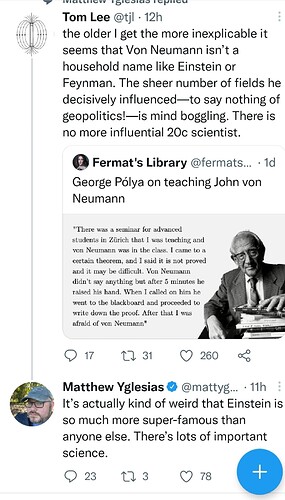Yeah, he probably took calc, but maybe didn’t do very well, didn’t care that much or had a bad teacher. Teacher quality is really underrated imo, even though it’s pretty highly rated. The classes I did really well in were invariably those where I liked/respected the teacher and I’ve seen the same with my kids, and also how much a bad teacher can put someone off a subject.
I think she mostly keeps her (Cayman flagged) yacht in the great lakes. I don’t think she’d be a good fit for New England Old Money society.
I loved math so much I don’t think that a bad teacher could have put me off. In high school I just had GOAT after GOAT, so it was never put to the test.
My math teacher luck ran out once I got to college. I had one OK one (he was fine, but the others who taught the same courses were considered much better), but I had him for two different classes.
My guess is the physics teacher was the bad one. The calculus in a physics 101 class is pretty basic. There are quite a few versions of the course though. Maybe he took one for more advanced students. I tutored a few students doing that and their work was definitely tougher.
Anthro? I’m extremely curious about the hard math in anthro. The few anthro majors I knew would have found anything more than arithmetic a challenge.
More than 30 years ago. I don’t really remember. It was probably statistics.
Maybe they couldn’t handle solving for t in exponential decay.
It was a TV show and a movie. The TV show used “alright” and the movie used “ all right”
I got an A in AP calc in high school and never learned a single real world application of calculus. It wasn’t until college or later that I was reading Wikipedia or something and understood like the general concept of what calculus is and then looking back the curves and integrals and stuff made a lot more sense.
I assume this is what Nate meant in his tweet btw. Like, I doubt that he was incapable of memorizing how to do the math they were teaching, but that’s not really learning. It’s memorizing.
To comment on the discussion about the Nate tweet, there is a big gap between typical Econ major and typical Econ PhD student and another big gap between PhD student and productive academic economist
Hard disagree there. Once you get past basic algebra, there are almost no “real world applications” of any math that kids are taught. That doesn’t mean that they are memorizing it. For the smart kids, it mostly just makes sense and there is not much memorizing involved.
Not sure if this is what catface meant but as an example, it’s easy to show someone how to integrate or differentiate a polynomial, which is a common thing you’re asked to do in physics 101. You can also pretty quickly explain what it means in a physical situation. But if Nate didn’t have the background it would seem magical and could be described as formal and hard (to understand why it works, not how to do it). I think that’s what micro was saying, but it’s still hard for me to believe Nate hadn’t had calculus.
I don’t know if physics 101 problems qualify as real life for most people but a physics professor would say yes.
I took AP physics when I was a senior in high school, and that is what made calculus click for me. The applications in physics, such as figuring out what happens when a projectile is shot at a certain velocity and angle, were so much more intuitive to me than the bizarre scenarios used as problems in my calculus class. Like I think there was some problem about a tank of water that was being filled up but also had a leak and another problem about a ladder leaning against a wall that was falling down. Both of those seemed super confusing to me.
The water tank and ladder problems are classic calculus textbook problems (lol). Questions about ladders are popular in physics too. They involve friction, torque, decomposition of vectors (forces) into components, and Newton’s laws, so they make good “real world” examples of a combination of concepts. Bound to be on the test, so practice those.
Newton would approve that physics gave you insight into calculus since at least for him, physical problems were the motivation for developing calculus in the first place.
Not sure if this is what catface meant but as an example, it’s easy to show someone how to integrate or differentiate a polynomial, which is a common thing you’re asked to do in physics 101. You can also pretty quickly explain what it means in a physical situation. But if Nate didn’t have the background it would seem magical and could be described as formal and hard (to understand why it works, not how to do it). I think that’s what micro was saying, but it’s still hard for me to believe Nate hadn’t had calculus.
I don’t know if physics 101 problems qualify as real life for most people but a physics professor would say yes.
I didn’t read catface that way. My opinion is that real world application has nothing to do with whether you learn math by “memorizing it” vs “understanding it”.
If you teach a smart kid calculus, they will pick it up with minimal intentional memorization, because it will mostly just make sense. I don’t think that introducing real world applications of calculus helps make it less dependent on memorization. Especially for someone as good at math as Nate probably was at the time.
For me personally, using calculus to solve physics problems did not improve my understanding of calculus one bit.
We have a difference in perspective. I’d say the difference between a
generic smart kid (not Von Neumann) and a not-so-smart one is mostly due to their backgrounds (just how much of a subject they’ve seen and thought about before, including and maybe especially outside a classroom). They’ll both reach a limit to having things make immediate sense, at which point they have to give up or at least temporarily take things for granted (memorize). When that immediate “yeah, this is obvious” feeling deserts them, real-world applications help to get it back. At least that’s the intention.
Just like econophile, I had trouble with water tank (related rates, work, energy) problems in calculus. In my case, it was because some of the physical ideas got extracted. After physics, looking at the calculus examples again it was suddenly, “oh”.
Even for professionals, physics is a primary source of inspiration for mathematical ideas and vice-versa. There’s a lot of back and forth going on. Understanding is all about making connections.
They’ll both reach a limit to having things make immediate sense, at which point they have to give up or at least temporarily take things for granted (memorize).
I don’t entirely disagree with this, but I think for most smart math kids, which includes Nate and a large fraction of unstuckers, that limit is not reached during basic calculus.


